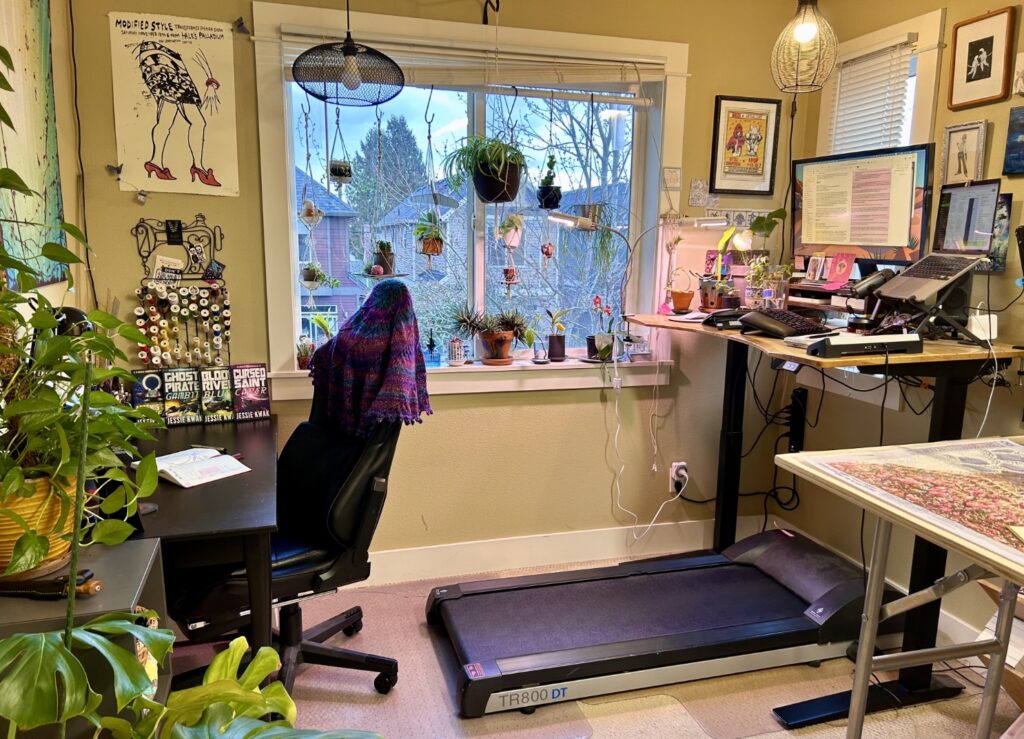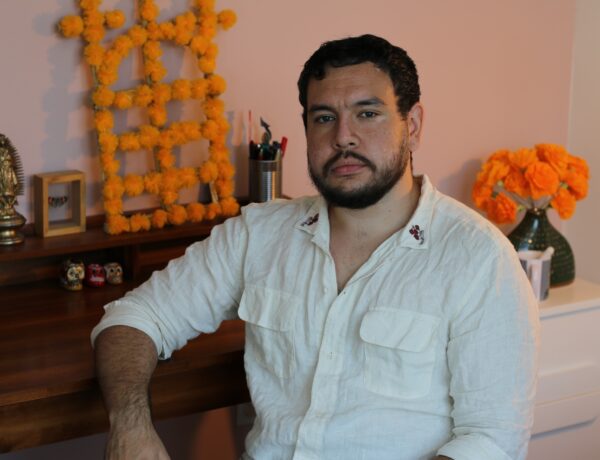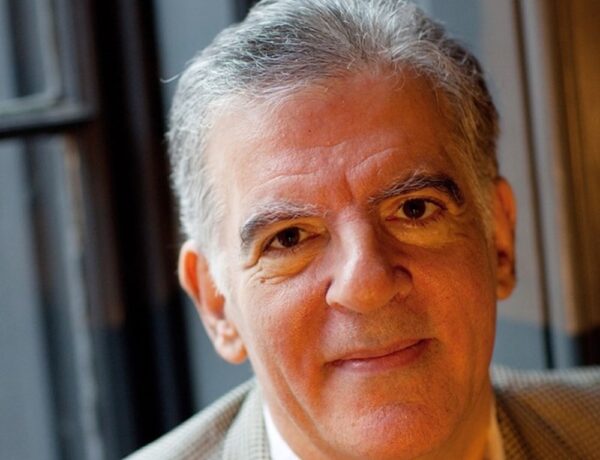Jessie Kwak is a Portland-based author who loves to create immersive worlds filled with captivating characters and thrilling adventures.
She is the author of the supernatural thriller From Earth and Bone, the Bulari Saga series of gangster sci-fi novels, and the productivity guide From Chaos to Creativity. When she’s not writing, she enjoys sewing, mountain biking, and exploring new places.
Looking for inspiration to help you achieve your writing goals? Subscribe to our newsletter for exclusive insights into the routines, habits, and techniques of some of the most celebrated authors in history.
Hi Jessie, welcome to Famous Writing Routines, great to have you here with us today! Can you tell us a bit about your new novella, Artemis City Shuffle, and what inspired you to write it?
Thank you for having me! Artemis City Shuffle kicks off my newest series, the Nanshe Chronicles. The series follows a crew of misfits as they do heists for good — similar to the television show Leverage, but with a good dash of Firefly and The Expanse.
In Artemis City Shuffle, I introduce the readers to most of the characters in the crew. Raj has been hired to be the bodyguard of a sweet old grandma who’s visiting her grandson in Artemis City (easy job, right?), while Lasadi is trying to steal back something from one of the local crime lords.
Both of their jobs seem separate, but as their paths keep intersecting, it becomes clear that these two characters are on a collision course that will change their lives.
The main characters of Artemis City Shuffle, Raj and Lasadi, are both down on their luck when they meet. Can you talk about their individual journeys and how they come together in the novella?
Absolutely! Both Raj and Lasadi are dealing with the repercussions of Corusca’s disastrous war for independence from the Alliance, three years earlier. Raj fought for the Alliance before he eventually deserted after learning a horrible secret; Lasadi (and her friend Jay, who’s also in this book) were fighters in Corusca’s liberation movement.
Both Raj and Lasadi have been adrift ever since, and neither of them are dealing with the loss, guilt, and PTSD in a particularly healthy way. Raj has been taking bigger and bigger risks, not caring if he makes it out. Lasadi has basically shut out everyone she loves.
When they come crashing into each other’s lives, it’s exactly the thing both of them need to get onto a path of healing. (And adventure, of course.)
One of the themes in the book is the challenge of protecting someone who is difficult to protect. How did you approach this theme and incorporate it into the story?
I love this question, because it was a very subconscious theme at first, but the farther I got into the series, the more I realized how strong it is.
In Artemis City Shuffle, Raj’s job is to protect a sweet old granny. It’s a nice, safe gig — or so he thinks. Eventually, he starts to realize that there are assassins after granny, and that she’s not quite as harmless as she seems on the surface. In the end, the best way to protect her is to work with her — not to steamroll her.
It’s pretty good training for when he meets Lasadi, actually. Lasadi is prone to running headlong into danger without thinking of herself, and as the series progresses Raj learns to help and protect her without holding her back.
This theme has really started to surface in the most recent book in the series, Star Train Tango, where all the members of the crew are learning that sometimes protecting the ones you love means letting them lead the way.
Your work spans across various genres from supernatural thriller to gangster sci-fi, what inspires you to write across different genres?
Science fiction and thriller are my two favorite genres to read, so almost everything I write includes some elements of each. Whether that’s my gangster sci-fi books (The Bulari Saga) which draw from my love of mafia movies, or my supernatural thriller (From Earth and Bone) which is set in Seattle — but an alternate reality Seattle where ghosts are real and can be summoned as part of the legal system.
I really enjoy the imaginative freedom of writing science fiction and supernatural stories, partly because it allows me to set up a world with rules that are different from our own, which give me a backdrop to explore different themes.
But mostly, I love following a compelling character who seems like they’ll take me on an adventure. I don’t always know where the story’s going when I start writing, but I always know I’m in for a wild ride.
Do you struggle to stay focused while writing? You’re not alone! That’s why Famous Writing Routines recommends Freedom – the ultimate app and website blocker for Mac, Windows, Android, iOS, and Chrome. With over 2.5 million users, Freedom helps writers stay on task and avoid distractions. Get started for free today and reclaim your productivity!
From Chaos to Creativity is a book that helps people improve their productivity. Can you share with us some tips on how to stay productive as a writer?
Yes! I wrote From Chaos to Creativity because I loved reading productivity books, but I hadn’t found one that worked well with my creative brain and job description.
I think one of the biggest productivity problems writers face is finding both focused time and a focused brain. It doesn’t help to carve out two hours on a Saturday morning if your brain is distracted by everything else you need to do.
As a “bigger picture” productivity tip, one of the best things writers can do is create a productivity system that helps them capture all the incoming chaos (personal, work-related, and writing-related) and quickly prioritize it. That way, when you set aside time to write you can do so without your brain yelling, “Wait, you’re forgetting something!”
My number one small tip to have a more productive writing session is brain dumping. Before you start writing, take a few minutes and hand-write everything that’s bouncing around in your brain. Then, when you’re writing, keep a small note pad next to you. Any time your brain starts yelling distractions at you, write yourself a note about it, then go back to your work.
The simple act of capturing distractions on paper can help your brain relax enough for you to focus on your writing.
Can you tell us about your writing routine? What does a typical day look like for you?
I’m a freelance business book ghostwriter as well as a fiction author, so my writing routine varies a bit depending on whether I’m balancing client work with my own writing projects.
No matter what I’m working on, my morning routine is fairly similar:
- Wake up around 6:30 or 7, do some yoga or exercise, then make breakfast (or go to the coffee shop)
- Get to my desk around 8 or 8:30 and get myself prepared to work as I eat breakfast — normally that means either answering emails or journaling
- Work on my main priority writing project from 9ish to noon
- Eat lunch
After lunch, the routine varies. I might have client calls, appointments, or errands to run. If I don’t and my energy is good, I’ll keep working on my priority writing project. If my energy is flagging, I’ll default to less creative work (like setting up newsletters or marketing), or go for a walk and dictate drafts.
If you could have a conversation with any author throughout history about their writing routine and creative process, who would that person be?
Ray Bradbury. His book, Zen in the Art of Writing, is one of my favorite collections of writing essays because he seems to have taken such a childlike joy in the writing process. So many writers are so serious! I think we could all learn to have a bit more fun along the way.
I’d love to know about the books you’re reading at the moment. What have been some of your favorite recent reads?
One of my favorite recent reads is Children of Time by Adrian Tchaikovsky.
All books have the ability to increase our capacity for empathy, but science fiction does it in a really unique way. In Children of Time, Tchaikovsky not only explicitly explores the role of empathy in our human evolution, he builds the reader’s empathy for, well, I don’t want to spoil it.
But let me just say I went surprisingly quickly from, “Woah woah woah, Portia is a what now?” to “I will kill for Portia and her society!”
What does your current writing workspace look like?
I took over our guest bedroom during COVID, and transformed it into a really special place filled with colorful artwork and house plants.
I mostly write at a standing desk, with a treadmill underneath so I can stroll leisurely as I work. I find it helps keep me focused, as well as making sure I get my steps in each day. If I need to get away from the computer, I have a second desk in the room which has no devices on it.
That second desk doubles as my sewing table, and I also have a large folding table that I use for cutting out sewing projects.
Of course, we’re starting to have guests stay with us again, so over the last winter, I built a Murphy bed which can fold down when we have company. But it really is magical to have a place where I can shut the door and enter my own world for as long as I need to.

Affiliate disclaimer: Some links on this website are affiliate links. We may earn a small commission if you make a purchase through these links, but only promote products we truly believe in. We disclose affiliate links and give honest reviews.



No Comments